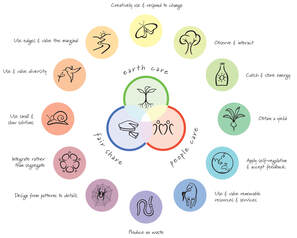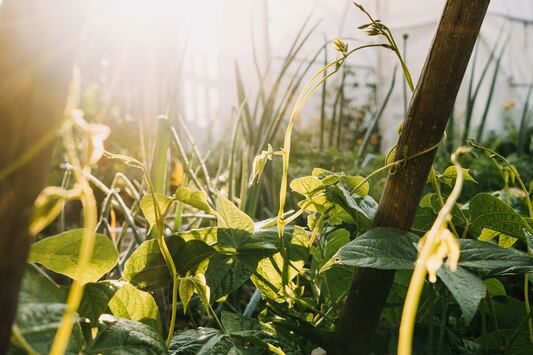|
by Colette Hehle Permaculture denotes a set of principles by which earth-lovers design sustainable, organic farms and gardens. The word can be broken down as “permanent cultivation” or “permanent agriculture” to refer to its use of perennial plants and slow, long-term solutions, but it can also imply a philosophy of life: an attempt at designing a “permanent culture.” Although not defined by Bill Morrison and David Holmgren as “permaculture” until the 1970’s, these practices draw on organic and indigenous farming techniques from across the globe—and on patterns found within God’s original design plan for creation itself. Permaculture represents a space of unity among diversity. The descriptions of creation in Genesis 1 and 2 make it clear that God designed not only humanity, but also the whole universe. “All the wild birds are mine, and all living things in the fields” (Psalm 50:11), says the Psalmist regarding our Creator. Indeed, humanity was the last to be created, illustrating our dependence on the creation that precedes us: the light, the water, the earth, the Spirit.
“Christian permaculture” could, I think, provide a blueprint for how we create our world. Seeing that life grows particularly strong at the edges of forests and ponds, we in the permaculture community garden—and live--paying special attention to what’s at the margins. With plants and with people, that’s where change often starts. People of color, those of low socio-economic status, and other marginalized groups are the first to suffer the effects of climate change, food deserts, and pollution, and they must be the first on our hearts when we seek to address those issues. We follow their leadership and listen to their testimonials, for world-changing truth is found in these spaces. We value diversity of life, as seen in all natural groves, forests, and fields. Our gardens contain variety, and we seek to create the same diversity in our families, friend-groups, and workplaces. In both worlds of both plant and human, diversity strengthens us to withstand many challenges by offering multiple solutions. A taller plant can shade a smaller one, while the small plant produces nitrogen that feeds the taller one. Similarly people, equipped with different life experiences, can protect and enrich one another with different solutions to problems.
Job may as well be describing permaculture when he tells his friends: “But ask the animals what they think – let them teach you; let the birds tell you what’s going on. Put your ear to the earth – learn the basics. Listen – the fish in the ocean will tell you their stories. Isn’t it clear that they all know and agree that God is sovereign, that he holds all things in his hand?” (MSG, Job 12:7-12 ). This passage shows the reliability and wisdom of the natural world to deliver a blueprint for God’s intents and purposes—“the basics” through which life can flourish. Through careful, prayerful discernment, the Christian permaculture designer mimics the practices of God acting in nature; thus we honor and sustain the life over which God gave us stewardship. Let us conclude by remembering that, in Genesis 1:28, “dominion” does not imply the unrelenting exploitation that we as a species have enacted upon the world. Perhaps, as in some versions of the Bible, this word might be better translated as “stewardship.” Regardless, Genesis also tells us that we were created in the “image” (Genesis 1:27) of God. We should, therefore, follow God’s ways, offering justice, mercy, and love to the sacred creation which, in turn, provides our own sustenance. God decrees that we come forth from the earth, live on it, and return to it in the end. In every stage of that journey, our existence is contingent on the living planet we call home. Bring permaculture to life for yourself today. Plant a sustainable garden, or plant the seeds of hope in a community through advocacy and non-profit work. Cook a healthy, sustainable meal for your family, reduce your household’s energy consumption, or harness waste through composting. There are so many ways to bring permaculture–and Christian spirituality–into one’s daily life. It might be surprising how often the two align!
0 Comments
FOR IMMEDIATE RELEASE
NOAA-funded project will build resilience in faith communities across the East Coast Washington, D.C. - Creation Justice Ministries is pleased to announce new funding from the NOAA Environmental Literacy Program to support a new project focused on building resilience in faith communities: “Participatory Education in Faith Communities for Climate Resilience.” Through this project, we will create networks of faith communities that are educated on the realities of climate change and able to serve as hubs of social and physical resilience for their communities. The project will be undertaken in partnership with Interfaith Power & Light (DC.MD.NoVA) in Maryland, North Carolina Interfaith Power & Light, and Virginia Interfaith Power & Light. "At Creation Justice Ministries, we believe that faith communities have a unique role to play in addressing the climate crisis," says Avery Davis Lamb, co-Executive Director of Creation Justice Ministries. "We are excited to partner with community partners, non-profits, agencies, and policymakers to build networks of faith communities that are educated on the realities of climate change and able to serve as hubs of social and physical resilience for their communities. This project will help our faith communities serve as places of refuge in the midst of the climate crisis, better weathering the physical, social, and spiritual storms of the climate crisis." "The communities living on Maryland's Eastern Shore are among the first to be facing the threats and harms of our damaged climate," says Joelle Novey of Interfaith Power & Light (DC.MD.NoVA). "We also know that Black church communities like those in Salisbury bring tremendous spiritual resources and wisdom to this moment. We're delighted to have the opportunity to learn together through this project as all of us prepare to navigate a stormy future." "The goal of this project is to create a network of North Carolina faith communities that are educated on the realities of climate change and able to serve as hubs of social and physical resilience for their communities – helping them better weather the physical, social, and psychological storms of the climate crisis," says Susannah Tuttle, Director of NC Interfaith Power & Light. "In particular, community-based workshops will build on North Carolina’s Coastal Resiliency Plan by bringing together faith leaders, academics, and government officials to address resilience in the Counties of Beaufort and Pamlico in North Carolina." "We are honored to partner with the people of Mathews County, community, and faith leaders," says Rev. Dr. Faith Harris, Executive Director of Virginia Interfaith Power & Light. "to support the work of developing a community-based and led resilience plan. Sea level rise seriously threatens the way of life Mathews residents have grown to love. This project will empower community members to plan for and protect that way of life for the future." "We are excited to partner with Creation Justice Ministries and Interfaith Power & Light on this project to empower faith communities with the knowledge and skills they need to become more resilient against the impacts of climate change,” says Louisa Koch, Director of NOAA Education at the National Oceanic and Atmospheric Administration. “By bringing together the community-based work of faith organizations and local universities with resilience expertise from federal and state agencies, we can build stronger, more prepared communities. This project exemplifies NOAA's commitment to science, service, and stewardship, and we look forward to the positive outcomes it will produce." We are grateful to the NOAA Environmental Literacy Program for their support of this important project, and look forward to working with our partners to build resilience in faith communities across the country starting in May 2023. About Creation Justice Ministries: Creation Justice Ministries (formerly the National Council of Churches Eco-Justice Program) represents the creation care and environmental justice policies of major Christian denominations throughout the United States. We work in cooperation with 38 national faith bodies including Protestant denominations and Orthodox communions as well as regional faith groups, and congregants to protect and restore God's Creation. Our mission is to educate, equip and mobilize Christian individuals, congregations, denominations, and communions to protect, restore and rightly share God's creation. Contact: Avery Davis Lamb, Co-Executive Director Creation Justice Ministries [email protected] (785) 217-6784 |
About this BlogThis blog shares the activities of Creation Justice Ministries. We educate and equip Christians to protect, restore, and rightly share God's creation. Archives
July 2024
Categories
All
|
Photo from johndillon77



 RSS Feed
RSS Feed